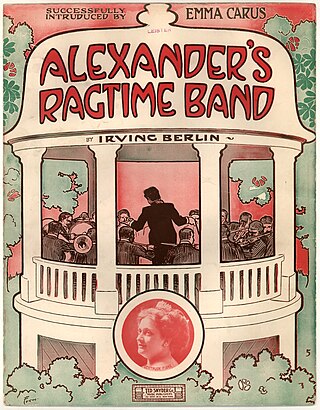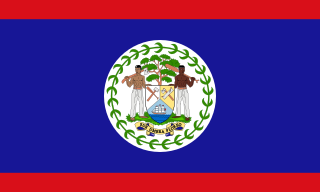Related Research Articles

"Alexander's Ragtime Band" is a Tin Pan Alley song by American composer Irving Berlin released in 1911; it is often inaccurately cited as his first global hit. Despite its title, the song is a march as opposed to a rag and contains little syncopation. The song is a narrative sequel to Berlin's earlier 1910 composition "Alexander and His Clarinet". This earlier composition recounts the reconciliation between an African-American musician named Alexander Adams and his flame Eliza Johnson as well as highlights Alexander's innovative musical style. Berlin's friend Jack Alexander, a cornet-playing African-American bandleader, inspired the title character.
Dancehall is a genre of Jamaican popular music that originated in the late 1970s. Initially, dancehall was a more sparse version of reggae than the roots style, which had dominated much of the 1970s. In the mid-1980s, digital instrumentation became more prevalent, changing the sound considerably, with digital dancehall becoming increasingly characterized by faster rhythms. Key elements of dancehall music include its extensive use of Jamaican Patois rather than Jamaican standard English and a focus on the track instrumentals.

The Jazz Age was a period in the 1920s and 1930s in which jazz music and dance styles gained worldwide popularity. The Jazz Age's cultural repercussions were primarily felt in the United States, the birthplace of jazz. Originating in New Orleans as mainly sourced from the culture of African Americans, jazz played a significant part in wider cultural changes in this period, and its influence on popular culture continued long afterwards.

Romani music is the music of the Romani people who have their origins in northern India but today live mostly in Europe.

The music of Belize has a mix of Creole, Mestizo, Garìfuna, Mayan and European influences.
Mento is a style of Jamaican folk music that predates and has greatly influenced ska and reggae music. It is a fusion of African rhythmic elements and European elements, which reached peak popularity in the 1940s and 1950s. Mento typically features acoustic instruments, such as acoustic guitar, banjo, hand drums, and the rhumba box — a large mbira in the shape of a box that can be sat on while played. The rhumba box carries the bass part of the music.
Jamaican culture consists of the religion, norms, values, and lifestyle that define the people of Jamaica. The culture is mixed, with an ethnically diverse society, stemming from a history of inhabitants beginning with the original inhabitants of Jamaica. The Spaniards originally brought slavery to Jamaica. Then they were overthrown by the English. Jamaica later gained emancipation on 1 August 1838, and independence from the British on 6 August 1962. Black slaves became the dominant cultural force as they suffered and resisted the harsh conditions of forced labour. After the abolition of slavery, Chinese and Indian migrants were transported to the island as indentured workers, bringing with them ideas from their country.

The Wire is a British music magazine publishing out of London, which has been issued monthly in print since 1982. Its website launched in 1997, and an online archive of its entire back catalog became available to subscribers in 2013. Since 1985, the magazine's annual year-in-review issue, Rewind, has named an album or release of the year based on critics' ballots.

Paul D. Hudson, known professionally as H.R., is an American musician who leads the hardcore punk band Bad Brains, and is an instrumental figure in the development of the genre. His vocal delivery has been described as diverse, ranging from a rapid-fire nasal whine, to feral growling and screeches, to smooth near-crooning or staccato reggae rhymes. He has departed the band periodically to pursue solo efforts that are more reggae than Bad Brains' punk sound. He is the older brother of Earl Hudson, Bad Brains' drummer.
Olive Marjorie Senior is a Jamaican poet, novelist, short story and non-fiction writer based in Toronto, Ontario, Canada. She was awarded the Musgrave Gold Medal in 2005 by the Institute of Jamaica for her contributions to literature. Senior was appointed Poet Laureate of Jamaica in 2021.

William Beckford of Somerley was a Jamaican-born planter and writer who wrote on the topography and conditions of slavery in the British colony of Jamaica and the history of France.

Several Green Bay Packers cheerleading squads have performed in Green Bay Packers' history. The Packers became one of the first professional football teams to have a cheerleading squad, having first used cheerleaders in 1931. The squad performed for 57 years under three separate names. In 1988, it was decided that the team would cease having a professional squad cheer for them. Since 1988, the team uses collegiate squads in a limited role to cheer during home games.
A notable year in the history of Jamaican music was 1907, when Walter Jekyll's Jamaican Song and Story was first published. The contents of this book include four parts entitled "Anancy Stories", "Digging Sings", "Ring Tunes", and "Dancing Tunes". Each part has an introduction, songs, stories, and melodies.
The gumbe or bench drum is a frame drum found in French Guiana, Jamaica and Sierra Leone. It has a small size, with square frame and one head of goat skin.

Atlantropa, also referred to as Panropa, was a gigantic engineering and colonisation idea that German architect Herman Sörgel devised in the 1920s, and promoted until his death in 1952. The project was devised to contain several hydroelectric dams in key points of the Mediterranean Sea, such as the Strait of Gibraltar and the Bosporus, to cause a sea level drop and create new land to settle.

CBS Records International was the international arm of the Columbia Records unit of Columbia Broadcasting System, Inc. (CBS) formed in 1961 and launched in 1962. Previously, Columbia Records had licensed other record companies to manufacture and distribute Columbia recordings outside North America, such as Philips Records and its subsidiary Fontana in Europe.
Kenneth Lloyd Khouri was a pioneering Jamaican record producer and founder of Federal Records, the first recording studio in Jamaica, which was sold to Bob Marley's Tuff Gong record label in 1981. He is credited by reggae historians for the birth of rocksteady in the 1960s. Rocksteady later mixed with Jamaican mento, a genre in which Khouri also had a pioneering role, leading to the creation of reggae music.
The National Dance Theatre Company of Jamaica (NDTC) is Jamaica's leading dance theatre company.
Marjorie Whylie СD OD is a Jamaican pianist, percussionist and educator who was musical director of the National Dance Theatre Company for 45 years.
Ivy Baxter was a pioneer in the field of Jamaican dance. She was the first person to combine modern dance with Jamaica's African folk dance. Her work celebrating African cultural roots contributed to the Jamaican independence movement's creation of a national identity.
References
- ↑ History Notes: Information on Jamaica's Culture at the Jamaica (retrieved 13 February, 2012
- ↑ [Dancing postcolonialism: the National Dance Theatre Company of Jamaica], by Sabine Sörgel; published by Transcript Verlag; 2007, page 141, via Google Books
- ↑ Rock It Come Over: the folk music of Jamaica, with special reference to Kumina and the work of Mrs. Imogene "Queenie" Kennedy, by Olive Lewis; published by University of the West Indies Press, 2000; via Google Books